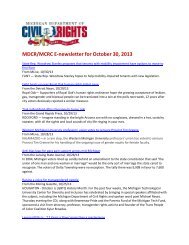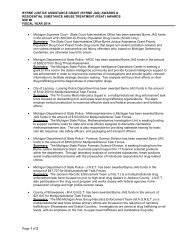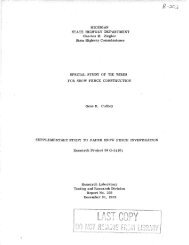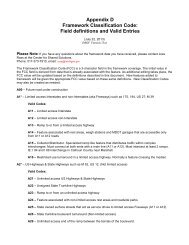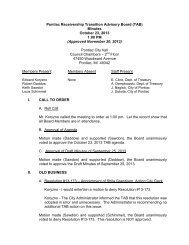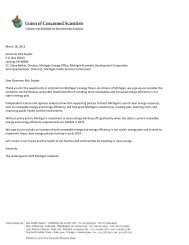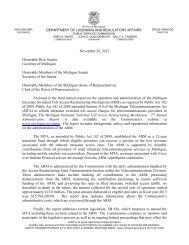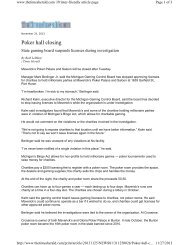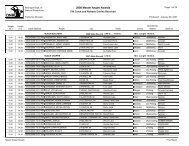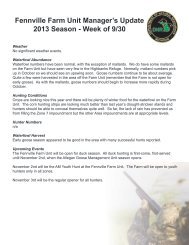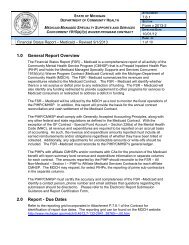michigan hypertension core curriculum - State of Michigan
michigan hypertension core curriculum - State of Michigan
michigan hypertension core curriculum - State of Michigan
You also want an ePaper? Increase the reach of your titles
YUMPU automatically turns print PDFs into web optimized ePapers that Google loves.
What is the most likely cause <strong>of</strong> this patient potassium being low? What are the steps that can<br />
be taken to prevent and treat the hypokalemia?<br />
Impression: This is a patient with well control BP while taking a thiazide diuretics and a dihydropyridine<br />
calcium antagonist. Hypokalemia refractory to potassium supplement is associated with depletion<br />
<strong>of</strong> magnesium stores. The combination <strong>of</strong> hypokalemia and magnesium depletion is usually seen in<br />
individuals receiving thiazide or loop diuretic treatment. 2 It has been suggested that potassium wasting<br />
is due to Na-K-ATPase impairment cause by magnesium deficiency. 3 Thus, a reasonable strategy<br />
would be to empirically administer magnesium replacement therapy given that her kidney function is<br />
normal. Measurement <strong>of</strong> serum levels can be misleading, especially if normal, because magnesium<br />
is primarily an intracellular ion and circulating levels are not necessarily indicative <strong>of</strong> magnesium<br />
depletion. Interestingly, some hypertensive patients will experience sleep disturbance. Magnesium is<br />
a reasonably effective sleep aid.<br />
Plan: Begin magnesium and potassium supplements together. Recheck potassium and magnesium<br />
levels after a few weeks.<br />
Case 3<br />
A hypertensive patient with diabetes who is taking a diuretic and the steps that can be taken to<br />
minimize or prevent diuretic induced hyperglycemia.<br />
Mr. AV was started on hydrochlorothiazide for his HTN diagnosed three months ago; at the time <strong>of</strong><br />
diagnosis his BP was 156/98 mm Hg. He has been taking glipizide for diabetes for the past 10 years<br />
which was well controlled until recently. He was recently discharged from the ED after experiencing an<br />
episode <strong>of</strong> elevated blood glucose (250 mg/dl). His BP at that time was 138/90 mmHg.<br />
PMH: Hypertension and diabetes mellitus<br />
Medications: Hydrochlorothiazide 25mg daily and glipizide 10 mg daily<br />
Physical Exam: BP <strong>of</strong> 136/92 mmHg, heart rate <strong>of</strong> 76 beat/mm, temperature 98 o F and RR 16. Cardiac<br />
exam is normal S1 and S2, Lungs are clear and extremities have no edema or cyanosis.<br />
Fasting CBG today is 140<br />
What is the most likely reason for the elevation <strong>of</strong> Mr. AV glucose level? What is the best step to<br />
take to minimize or prevent diuretic-induced hyperglycemia?<br />
Impression: Mr. AV’s BP has responded fairly well to the diuretic. However, his physician is not<br />
practicing evidence-based medicine. The initial anti-hypertensive drug that should have been<br />
prescribed was either an ACE inhibitor or an ARB. Nevertheless, because his BP was 26/18 mm hg<br />
above baseline when anti-hypertensive therapy was initiated, it was highly unlikely that BP control to<br />
< 130/80 mm hg would be obtained. Accordingly, he should have been placed on two drug therapy<br />
initially with one <strong>of</strong> the agents being either an ACE or an ARB; the other agent should have been either<br />
a diuretic or a calcium antagonist. Hypokalemia during diuretic therapy has been significantly linked to<br />
the development <strong>of</strong> hyperglycemia. A nice advantage <strong>of</strong> ACE or ARB therapy concurrent with a diuretic<br />
is that these agents substantially reduce the likelihood <strong>of</strong> diuretic-induced hypokalemia and have also<br />
been shown, not surprisingly, to minimize thiazide-induced elevations in serum glucose levels.<br />
Plan: Start candesartan 4mg daily and continue hydrochlorothiazide.<br />
NKFM & MDCH 273




